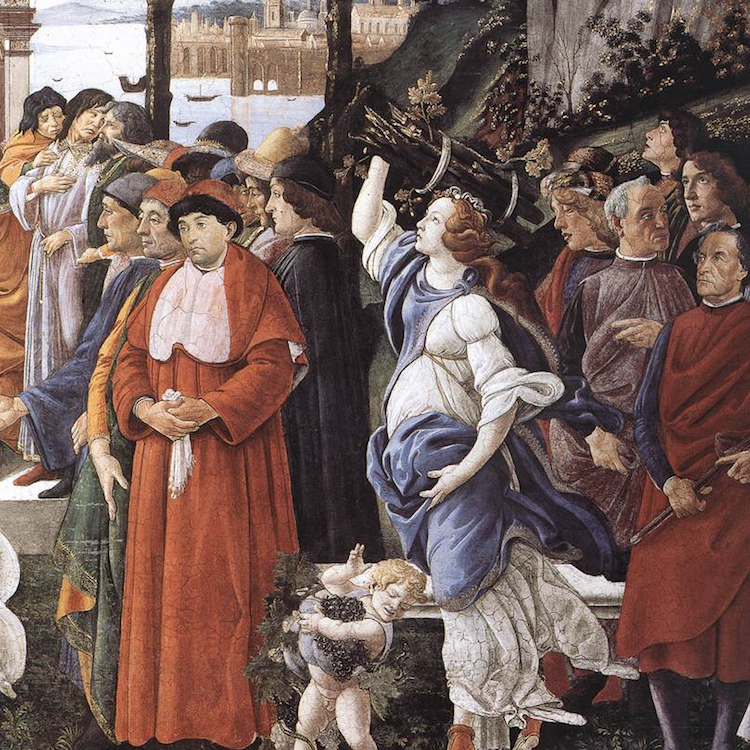You and I have prayed The Lord’s Prayer countless numbers of times. In it we always ask God to “lead us not into temptation but deliver us from evil.” Some translations of that famous prayer have it “and subject us not into the trial.” Just what is it that we are praying for?
Well obviously there are various levels of temptation — some powerful and severe, others not so powerful and not so grave (not weighted with much gravity). Some temptations are of the flesh. Some temptations are of the spirit. Some involve passion… others involve cold calculation.
Whatever a temptation’s quality or type may be, at whatever level, it is always a time of testing. Our resolve, our spiritual muscle, is being tested. And if our character is spiritually weak and flabby, without any muscle power at all, we will be a pushover for the devil.
Jesus also had His times of trial. The first we know about was during His time out in the desert immediately prior to beginning His public ministry. He experienced being alone and abandoned, with only His own resources to rely upon. He had his desert experience; we have ours. He knew temptation and trial just as we know them.
We need to pay attention to important words that come to us from important sources. We need, here, to pay attention to the biblical difference between what is a temptation and what is a trial. In the bible, a trial is always something far more profound than a temptation. The consequence that follows a trial has finality to it. There is a final, complete, and total outcome to a trial. Deliverance from the sort of trial Jesus is talking about in teaching us His prayer is nothing less than our trials by battle with the devil himself.
When we pray that God will protect us in the time of temptation and deliver us from the trial, we are asking God to be with us when we face the devil himself. All by ourselves we are weak.
The problem we face is that the devil always comes to us disguised… disguised as something or someone good. The chief weapon of the devil is to corrupt what is good. He takes goodness and then devalues it, debases it, corrupts it.
Do you have the gift of charm? Do you have a personality that can delight people? You can use it to seduce others. Do you have power over words? Are you a good wordsmith? You can use your tongue to corrupt others. Do you have the gift of intelligence? So does the devil! You can use your power of intelligence to corrupt the truth and twist it into a lie. One of the names given in the bible to Lucifer is “The Father of Lies.”
You see, just where we are the strongest the devil will come to challenge our strength to prove his greater strength.
All of this is presented to us in the trial of Jesus Christ. His spectacular trial was before the Roman governor of Judea, Pontius Pilate. It was the Roman governor, Pilate, who sat on the bench, called in witnesses to present evidence, made a judgment, and declared Jesus to be innocent. Nevertheless, immediately thereafter, in his weakness, Pilate ordered that Jesus be executed by crucifixion. In that most famous time of trial in history, was it Jesus who was on trial or was it Pontius Pilate?
We also have a glimpse into the spiritual trial Jesus suffered immediately before He was betrayed by one of His twelve apostles, Judas Iscariot. It was Judas who turned Jesus over to the Roman authorities. And what a trial it was — it is reported that Jesus suffered so terribly that He even sweat blood.
There are trials in which we are simply overcome. There are temptations that quite overwhelm us. We get into a level of evil that’s over our head. We drown in it. Which is why the waters of baptism are a counter-symbol. Christ converts the waters of death, which threaten to drown us, into the waters of life because we are drowned in His life.
Out in the desert, there at the beginning, the first temptations the devil put to Jesus were those that called Him to corrupt the good, to compromise His principles.
This is the most insidious aspect of the culture that surrounds us. It suggests that we compromise with evil. It suggests that we follow the easy way. Its first and most effective ploy is to get us to whine that “everybody’s doing it,” to feel sorry for ourselves, present ourselves as victims of an autocratic authority and scream about their unfairness. It’s unfair to deprive us, we whine, because “everybody else is doing it”. Then, if we can get just the slightest compromise, we can start the whole thing down a long descending slide until the point where all restraints end up on the ground.
Then we can redefine sin. We can change the definition of something that is wrong into something that is okay, just so long as it doesn’t hurt anyone else. After that we can ridicule the whole idea of sin. We can turn the devil into a cartoon character, declare that hell doesn’t exist, and depict holy people as ridiculous, unthinking, mindless robots who can’t take care of themselves. Religion then becomes a throwaway item, a nice sort of sentimental fancy that isn’t real in the world in which we must live.
Jesus final temptation, you see, the one suggested to Him as He was dying while nailed and writhing in terrible pain upon the cross, was to simply give up.
St. Augustine tells us that really evil people are not even tempted anymore because they are totally lost. It’s not necessary for the devil to waste any energy tempting them since they are totally corrupt. These kinds of people laugh at the idea of temptation – for them, temptations are silly things that don’t even exist. They simply don’t understand them because they don’t know what’s good any more. Like Pontius Pilate who, during his trail of Jesus, asked: “Truth? What is truth?” the question today is: “Good? What is good?” Indeed, just what is it that our culture holds up to be “good”?
How many of those around us do you suppose have sold out to evil, have sold their souls to the devil and given away their souls? Do you admire them? They are often, in today’s media, presented to us as gods and goddesses, media stars whom we should want to be like.
Evil, you see, truly is the corruption of Goodness, and the battle is going on deep within us, in our very own immortal souls. And so Christ teaches us to ask His Father to “…lead us not into temptation and deliver us from the trial.” Amen








